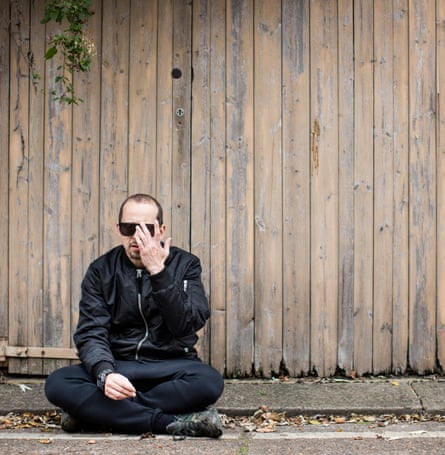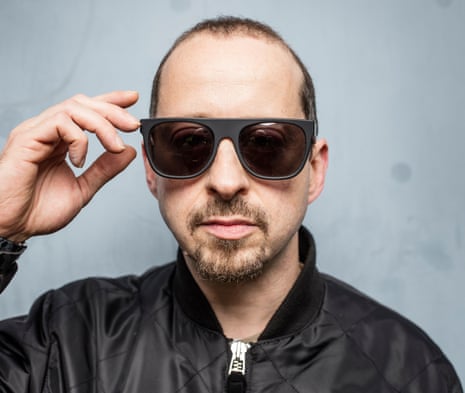Earlier this year Steve Goodman, better known as Kode9, developed a weird strain of what he calls the “zero virus”. Ever since New Year’s Eve, when he holed himself up in his studio to begin work on his third LP, he had been looking for a concept that might explain where he was at emotionally, musically and politically. “I started reading about mathematics and the history of zeros,” he says, “and about vacuums and voids in quantum theory. Suddenly zeroes were everywhere.”
Sitting opposite me in a rather soulless hotel garden in New York’s Lower East Side, the Glasgow-born, London-based DJ and producer warms to his theme. “Then I came across Paul Mason’s book PostCapitalism. It has a chapter on Project Zero: when production costs are reduced to zero, this has a massive impact on the whole system.”
The notion gave him the title for his album, the newly released Nothing. “If replication and distribution costs are tending towards zero,” he explains, “this is one of the most important engines in the transformation of the music industry. We don’t know where it’s heading. ‘Nothing’ was like a little encryption key that enabled me to finish the album.” Fittingly, the album is animated and motored by all sorts of powerful absences, with such track titles as Zero Point Energy, Vacuum Packed and Nothing Lasts Forever (the Cage-ean and mutely eloquent, nine-minute closer).
It’s rare to find a DJ – far less one who used to have a show on famed east London pirate radio station Rinse and whose revered Hyperdub label played a vital role in the rise of dubstep – pepper his conversation with references not just to economic commentators but to such philosophers and cultural theorists as Paul Virilio, Marc Augé and Friedrich Kittler as well.
But back in the 1990s, Goodman was a PhD student at the University of Warwick, where he became involved with the Cybernetic Culture Research Unit. A now-legendary secessionist movement within the department of philosophy, its associates included Kodwo Eshun of Turner prize-nominated duo the Otolith Group; Mark Fisher, author of Capitalist Realism; and Anna Greenspan, now a specialist in Sino-modernism. CCRU members disavowed the leftist pieties of their peers and fused cybernetics, metallurgy, bacteriology, chaos theory, science-fiction and the occult to explore, often in deliriously opaque language, what it meant to be alive in an age of hypercapitalism.
“The CCRU was into running simulations,” Goodman recalls. “We wanted to take humans out of the equation. We were interested in total automation – and not necessarily resisting that. We had an openness to future shock and a thirst to proliferate, intensify, nurture and encourage it.”
The CCRU’s influence can still be felt in the language Goodman uses to describe the way musical styles and dancefloor rhythms circulate globally. “I’ve always tried to be open to the idea of music as transversal, as impersonal – like a cloud, or a virus that passes through populations. It might start with an individual producer, but once it’s out in the world – as an entity that’s inhabiting, parasiting, using human bodies as hosts – somehow it attains a collective intelligence all of its own.”

Goodman, who was a lecturer at the University of East London for nearly a decade, wrote 2010’s well-received Sonic Warfare, an academic study about the use of sound to create social anxiety and fear. He used to talk about how early 1990s jungle was a kind of “brain transformation”, a gateway to thinking about velocity, intensity and neo-psychedelia. Nowadays he feels his sensibility was most profoundly affected by repeatedly watching the 1982 film Koyaanisqatsi, monk-turned-film-maker Godfrey Reggio’s evocation of American landscapes and cityscapes, with a soundtrack by Philip Glass.
“It was the first time in my life I’d seen time-lapse cinematography and been given the picture that the long-scale trajectory of civilisation is one of acceleration. I realised there were parallels between flows of bodies, flows of traffic and molecular flows. There were these juxtapositions of people moving through the underground system and looking like sausage-making factories. At the end, there was an analogy between a circuitboard and a cityscape. And the music gradually accelerated.”
Transformation and mutation have been central motifs for Hyperdub, the label Goodman founded in 2004. Best known for the vespertine dubstep of Burial, its releases (a striking number by female artists including Jessy Lanza, Cooly G and Fatima Al-Qadiri) are less interested in burnishing a signature style than in mapping the shifting contours of (black) Atlantic bass musics: grime, house, twisted R&B, UK funky, the woozy dream pop of Dean Blunt and Inga Copeland.
While the label is internationally lauded, the near-zero economics of independent music are less rewarding. “I don’t take any money from Hyperdub,” he says. “Any money I’ve earned is from DJ-ing. But as long as I don’t know where the label’s heading, and the sounds keep adapting, I’m happy.”
If 2014 started out in celebratory mood – Hyperdub released four 10th-anniversary compilations – it ended in a darker place. In April, DJ Rashad, a Chicago-based producer and pioneer of the increasingly popular footwork genre, died in a drug-related accident. Then, in October, Goodman’s friend and collaborator Stephen Samuel Gordon, an MC who recorded as the Spaceape, died after a long struggle with a rare form of cancer. Sine of the Dub, the pair’s beat-less version of Prince’s Sign o’ the Times, had been Hyperdub’s first release. Their two LPs, Memories of the Future and Black Sun, were sui generis: hermetic, evoking the apocalyptic dread of 1970s reggae, imbued with the mystery and melancholy of a noir thriller.
“Spaceape was like me. He never thought of himself as a career musician. I never felt people really liked our stuff. Our combination together had quite a polarising effect in the little scene we were in. We were always in another dimension. Most of the music was instrumental and most of the kids on the scene were younger than us. I was genuinely shocked by the reaction and the love that came in for him.”
Nothing, which briefly features the Spaceape on the track Third Ear Transmission, is the first album for which Goodman is solely responsible. It’s not, he insists, made out of trauma. “I’ve made enough miserable music in my time,” he smiles. “Ironically, that wasn’t the mood I was in for this record.”
One stand-out track is Nøtel: informed by Goodman’s longstanding passion for science fiction, it kindles Ballardian images of what he describes as an “evacuated, fully automated luxury hotel. There are no humans in it. The machines have been liberated. We don’t know why. It might be post-apocalyptic. It might have been a virus. It’s getting away from the Isaac Asimov idea in which machines are kept enslaved to their human masters. What happens when humans are no longer there?”
Goodman is fascinating company, jumping from “evil architecture” and the importance of French film-maker Chris Marker to the relevance of Italian autonomist theory for understanding the creative process. Can too many ideas spoil pop music? “I don’t identify with this artistic-musician perspective of spontaneity – ‘I didn’t think about it! It just happened!’ I know that’s not the case with most musicians. They have to engineer mental states through taking a shitload of drugs or hoovering the studio. A lot of preparation goes into being in a state where you think you’re not thinking about it.”
This article was amended on 16 November to reflect the fact that Goodman does not put his DJ earnings back into Hyperdub.

Comments (…)
Sign in or create your Guardian account to join the discussion